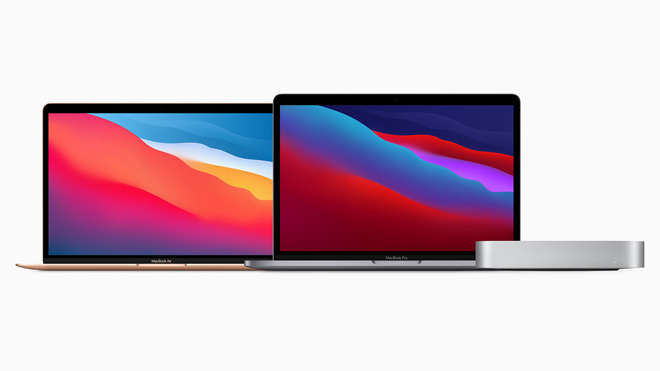New Apple Silicon Mac mini, MacBook Air, and MacBook pro are available to preorder
The new MacBook Air, MacBook Pro, and Mac mini models equipped with Apple Silicon chips are now available to pre-order.

Credit: Apple
Apple unveiled its stable of Mac devices with proprietary chipsets at its Nov. 10 "One more thing" event. The first three Mac models to be refreshed with the M1 chipset are among the company's most popular, and all will feature significant power efficiency and performance gains from the Apple-designed silicon.
The new Mac mini starts at $699, the MacBook Air starts at $999, and the 13-inch MacBook Pro with an M1 chip starts at $1,299.
All three devices are also available at an educational discount, bringing their prices down to $679 for the Mac mini, $899 for the MacBook Air, and $1,199 for the 13-inch MacBook Pro.
Pre-orders are live, but there's no word on when exactly the new Mac models will start shipping out to consumers. According to Apple, they'll begin arriving "starting next week."
In addition to orders from Apple.com and the Apple Store app, the company also said that M1-equipped Mac models will be stocked at select Apple Store and Apple Authorized Resellers the week of Nov. 16, as well.
Credit: Apple
Apple unveiled its stable of Mac devices with proprietary chipsets at its Nov. 10 "One more thing" event. The first three Mac models to be refreshed with the M1 chipset are among the company's most popular, and all will feature significant power efficiency and performance gains from the Apple-designed silicon.
The new Mac mini starts at $699, the MacBook Air starts at $999, and the 13-inch MacBook Pro with an M1 chip starts at $1,299.
All three devices are also available at an educational discount, bringing their prices down to $679 for the Mac mini, $899 for the MacBook Air, and $1,199 for the 13-inch MacBook Pro.
Pre-orders are live, but there's no word on when exactly the new Mac models will start shipping out to consumers. According to Apple, they'll begin arriving "starting next week."
In addition to orders from Apple.com and the Apple Store app, the company also said that M1-equipped Mac models will be stocked at select Apple Store and Apple Authorized Resellers the week of Nov. 16, as well.

Comments
Why did Apple think 16 GB of RAM was enough for the type of creative professionals they are apparently aimed at?
I think I will wait until real users benchmark each system before pulling the trigger. I love the whole concept of Apple Silicon but Apple's insistence on closed non-upgradable, non-repairable systems without real benchmarked performance numbers leaves me dismayed.
But to your point, I'd also guess that the "M" series chips stand for "Mobile" and for the iMacs etc there will be a "D" series (not sure if taken already) "Desktop" chip family.